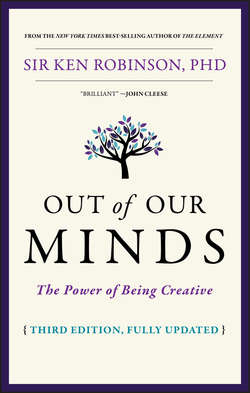Читать книгу Out of Our Minds - Робинсон Кен - Страница 11
На сайте Литреса книга снята с продажи.
1
OUT OF OUR MINDS
THREE THEMES
ОглавлениеThere are three core themes in this book.
We are living in times of revolutionary change
No matter where you are or what you do, if you live on earth you are caught up in a global revolution. I mean this literally not metaphorically. There are forces at work now for which there are no precedents. Human affairs have always been turbulent. What is distinctive now is the rate and scale of change. Two of the driving forces are technological innovation and population growth. Together they’re transforming how we live and work, changing the nature of politics and culture and putting perilous strains on the earth’s natural resources. The outcomes are unpredictable. What is certain is that we and our children are confronting challenges that are unique in human history.1
We have to think differently about our talents and abilities
Given the challenges we face, the most profound shift has to be in how we think about our abilities and those of our children. In my experience, many people have little idea of their real talents. Too many think they have no special talents at all. My premise is that we are all born with immense talents but that too few people discover or develop them. Ironically, one of the reasons is education. The waste of talent is not deliberate. Most educators have a deep commitment to helping students do their best. Politicians make impassioned speeches about making the most of every student’s abilities. The waste of talent may not be deliberate but it is systemic. Dominant approaches to education and training are preoccupied with certain types of ability that systematically overlook the talents and stifle the creative confidence of untold numbers of people.
We have to run schools, companies and communities differently
Leading a culture of innovation has radical implications for how institutions are organized, whether they are schools or corporations, and for styles of leadership. Business and public sector leaders commonly share three perspectives. They know that one of the biggest challenges they face is the increasing complexity of the global environment, which they expect to accelerate in the coming years. They are concerned that their organizations are not equipped to cope with this complexity. They agree that the most important leadership skill for dealing with this growing complexity is creativity. Many organizations put on occasional training days to encourage their staff to think creatively; but, like the rituals of rain dancing, I believe they may misunderstand the problems they’re trying to solve. The problems they face are immediate and there are some immediate things they can do to tackle them, but the long-term solutions lie upstream in the education system.
I’ve worked with national education systems, with school districts, principals, teachers and students from kindergarten to university and beyond, including community colleges and adult education associations. I’ve directed national research projects, taught in universities and trained teachers. I also work now with every type of business, including Fortune 500 companies, major banks and insurance houses, design companies, media corporations, information technology organizations, and with retail, manufacturing, engineering and service companies. I’ve worked with cultural centers in the arts and the sciences; with museums, orchestras, and with dance and theater companies and community arts organizations. My work has taken me to Europe, North America, South America, the Middle East and Asia. I know first hand that the education, business and the cultural sectors face many common challenges. Some are compounded by the fact that they have so little contact with each other.
When I talk with business leaders, they complain that education isn’t producing the people they urgently need: people who are literate, numerate, who can analyze information and ideas; who can generate new ideas and implement them; who can communicate clearly and work well with other people. They want education to provide such people and complain that it does not. When I work with educators they complain that the culture of standardization and testing, which politicians usually impose in the interests of the economy, is stifling the creativity of teachers and students alike. They want to provide a more balanced and dynamic form of education that makes proper use of their own creative energies. Too often they feel they can’t do any of this because of political pressures of conformity and the disaffection of students who suffer under the same malaise. Meanwhile, parents lie awake at night worrying about the quality of their children’s education. They assume that education will help their children to find work and become economically independent. They also want education to help young people to identify their unique talents and to lead a life that has meaning and purpose. This is what young people want for themselves. The best future for all of us lies in deeper forms of understanding and collaboration between all of these groups.
1
Life never stands still. Compared to other species, the rate of change in human societies has always been frenetic. Even so, the pace of change has been picking up considerably for the past 300 years. The eighteenth century saw political revolutions in Europe and in America. In the eighteenth and nineteenth centuries much of the world was convulsed by the rise of science and by the Industrial Revolution. The twentieth century was the bloodiest on record. It saw two World Wars, numerous regional conflicts and tumultuous revolutions in Russia and China. Overall, the twentieth century was the most murderous in human history: it’s estimated that more than 100 million people died at the hands of other human beings. It also saw extraordinary advances in science and technology and massive cultural changes, especially in the old industrial economies.
